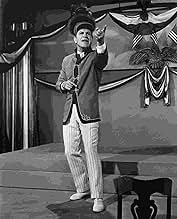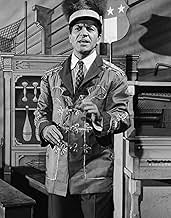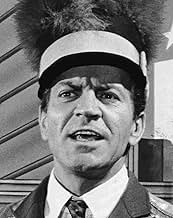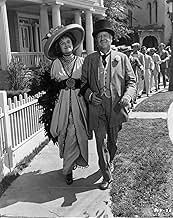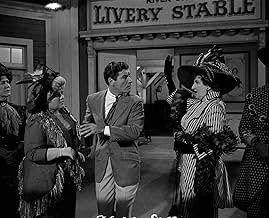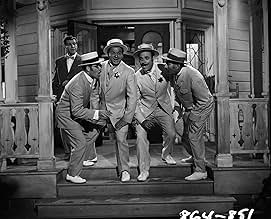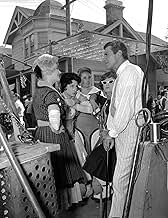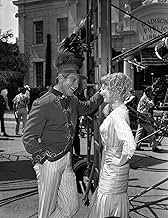Adicionar um enredo no seu idiomaTraveling con artist Harold Hill targets the naïve residents of a small town in 1910s Iowa by posing as a boys' band leader to raise money before he can skip town.Traveling con artist Harold Hill targets the naïve residents of a small town in 1910s Iowa by posing as a boys' band leader to raise money before he can skip town.Traveling con artist Harold Hill targets the naïve residents of a small town in 1910s Iowa by posing as a boys' band leader to raise money before he can skip town.
- Direção
- Roteiristas
- Artistas
- Ganhou 1 Oscar
- 6 vitórias e 12 indicações no total
- Jacey Squires
- (as The Buffalo Bills)
- Winthrop Paroo
- (as Ronny Howard)
- Ewart Dunlop
- (as The Buffalo Bills)
- Olin Britt
- (as The Buffalo Bills)
- Oliver Hix
- (as The Buffalo Bills)
- Direção
- Roteiristas
- Elenco e equipe completos
- Produção, bilheteria e muito mais no IMDbPro
Avaliações em destaque
The director Morton DaCosta uses a gimmick here and in Auntie Mame that I don't care for. At the end of some scenes, all the lights go out except those on the principals. Sometimes that's more of a jolt than necessary, because we've gone from outdoors to inside the studio.
My favorite song is Sadder But Wiser Girl. The reference to Hester winning just one more A meant nothing until 11th grade when we read The Scarlet Letter. And after Preston sings that line, he looks guiltily over his shoulder at Amaryllis to see if she understands how naughty he's been.
My second favorite is Lida Rose/Will I Ever Tell You. Such a beautiful song. It pains me that the rocking chairs at either end of the screen are sometimes out of sync. It should have been done perfectly.
One brilliant touch concerns the Buffalo Bills. Early on, Mayor Shinn says "The members of the School Board will not present a patriotic tableau. Some disagreement about costumes, I suppose." At the time, the four are dressed quite differently. As their singing progresses, they start dressing more and more alike, until at the end they're dressed alike (I'm pretty sure).
Marion's epiphany during The Wells Fargo Wagon is quite sweet.
As is a lovely line from Goodnight, My Someone: But I must depend on a wish and a star/ As long as my heart doesn't know who you are. (Sigh.)
Its splendors have already been mentioned. I add two minor treats: 1) appearance of lanky character actor Hank Worden (of "The Searchers" and "Twin Peaks") as the undertaker, and 2) script so full of bizarre slang and expressions, it's as if P.G. Wodehouse or Damon Runyan were writing turn-of-the-century Americana.
My two carps are minor: I would have told Morton Da Costa to lose all the heavy-handed cutaways to the train wheels ("Rock Island") and chickens ("Pick a Little, Talk a Little") because we already got the point, and Ron Howard's cute lithp is a turn-off for me, but I never like cute kids. However, he's good at the climax, and when Shirley Jones hears him singing "Wells Fargo Wagon" and tears the evidence against Harold Hill out of the book (a librarian!), it's one of the most convincing turnarounds in musical history. Especially because she's still not fooled by the hucksterism, she just perceives it differently in comparison with the easily manipulated small-towners around her. She realizes that he's selling hope and joy despite himself ("There's always a band.") And when she just thanks him for his gift ("Till There Was You") and doesn't mind if he flees, of course he realizes he would be insane to leave. Another heartfelt turnaround.
One of the most graceful musicals, marked by blurring of the line between straight dialogue and songs--as the line "there was love all around but I never heard it singing" implies, you can hear the singing if you listen for it in the world. It's in the trains and the chickens and the bands you hear in your head and the pride in your children playing that clarinet by the "think system." Moving.
Você sabia?
- CuriosidadesDespite Robert Preston's Tony-award winning performance in the Broadway production, Warner Bros. executives wanted a bankable star in the lead role of Professor Harold Hill for the movie. According to Shirley Jones, Frank Sinatra was offered the part, but Meredith Willson insisted on Preston and threatened to pull the movie rights. Cary Grant was also approached, but told the Warner Bros. executives, "Not only will I not star in it, if Robert Preston doesn't star in it, I will not see it." Preston got the part, and the movie was a big success, despite Warner Bros' misgivings.
- Erros de gravaçãoAs Harold makes his very first walk down Main Street after getting off the train, the hills in the background are at the far eastern end of the Santa Monica Mountains. Iowa is famously flat.
- Citações
Marian Paroo: No, please, not tonight. Maybe tomorrow.
Harold Hill: Oh, my dear little librarian. You pile up enough tomorrows, and you'll find you've collected nothing but a lot of empty yesterdays. I don't know about you, but I'd like to make today worth remembering.
Marian Paroo: Oh, so would I.
- Cenas durante ou pós-créditosThe closing credits appear in the style of a Broadway show's curtain call. First the minor characters are shown with the performers' names. The credits then progress through the cast ending with the lead.
- Versões alternativasThere's no closing logo except for the post-1991 prints that feature the Saul Bass version in the 1991 VHS, and 1992 version in the special edition VHS and DVD.
- Trilhas sonorasMain Title
(1957) (uncredited)
Music and Lyrics by Meredith Willson
Performed by Ray Heindorf and the Warner Bros. Studio Orchestra
Principais escolhas
Detalhes
- Data de lançamento
- País de origem
- Idioma
- Também conhecido como
- O Vendedor de Sonhos
- Locações de filme
- Empresa de produção
- Consulte mais créditos da empresa na IMDbPro
Bilheteria
- Orçamento
- US$ 4.240.000 (estimativa)
- Tempo de duração
- 2 h 31 min(151 min)
- Cor
- Proporção
- 2.35 : 1


